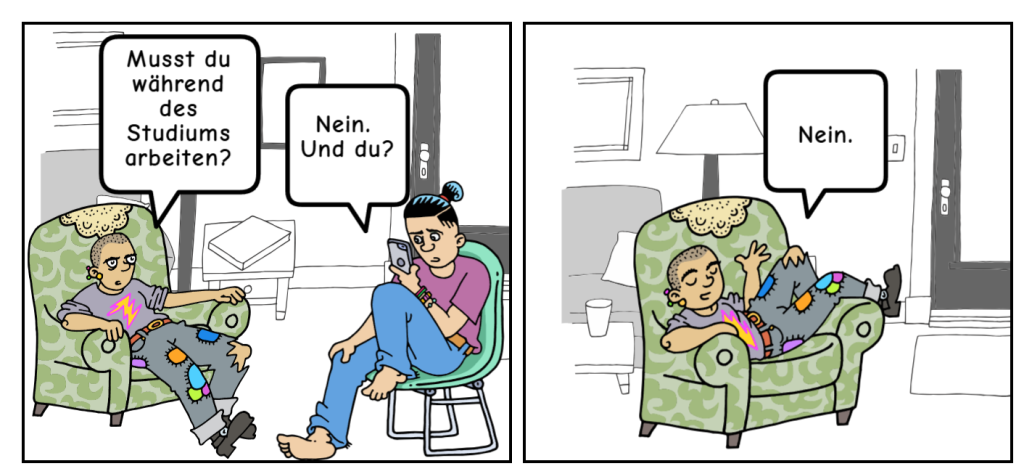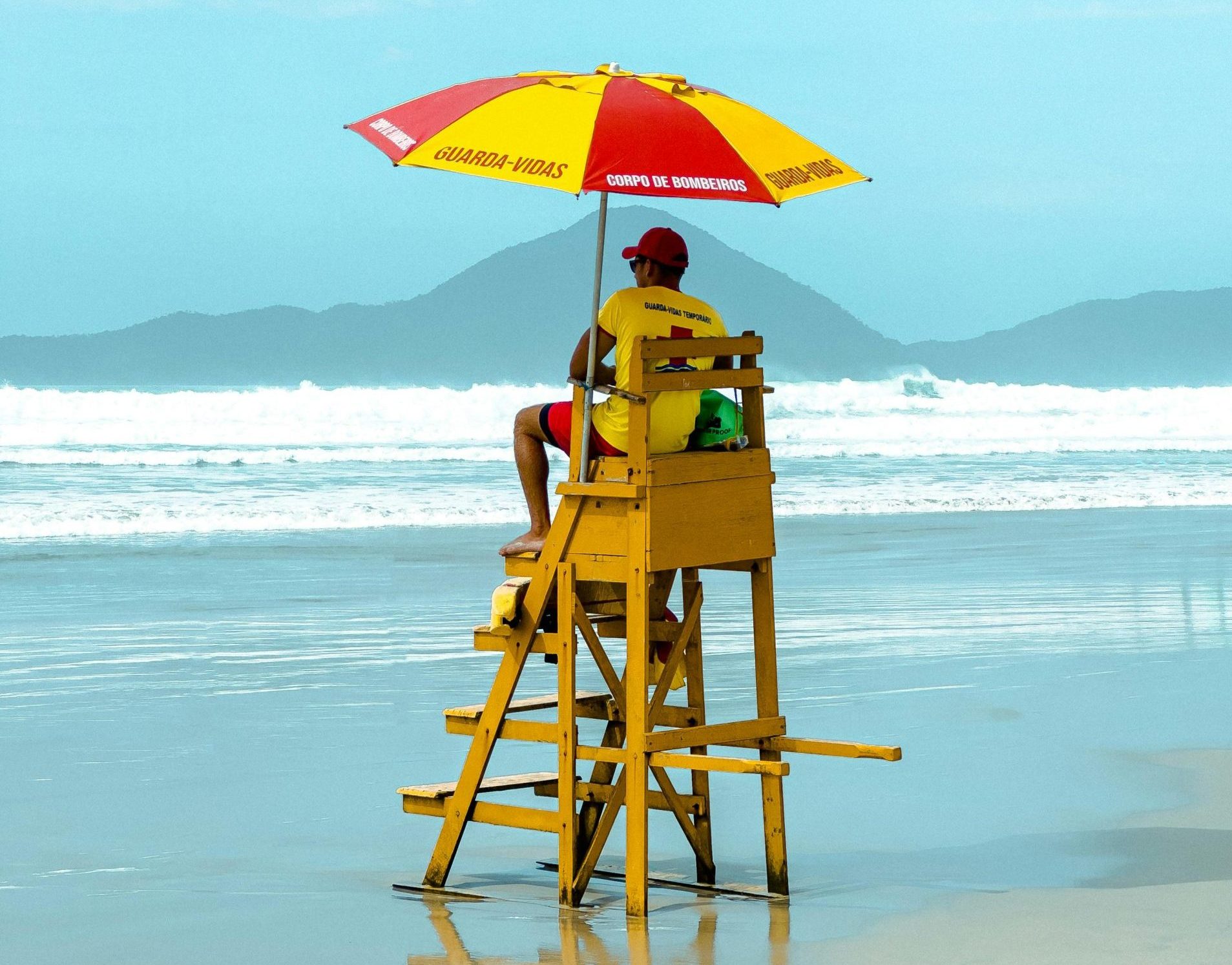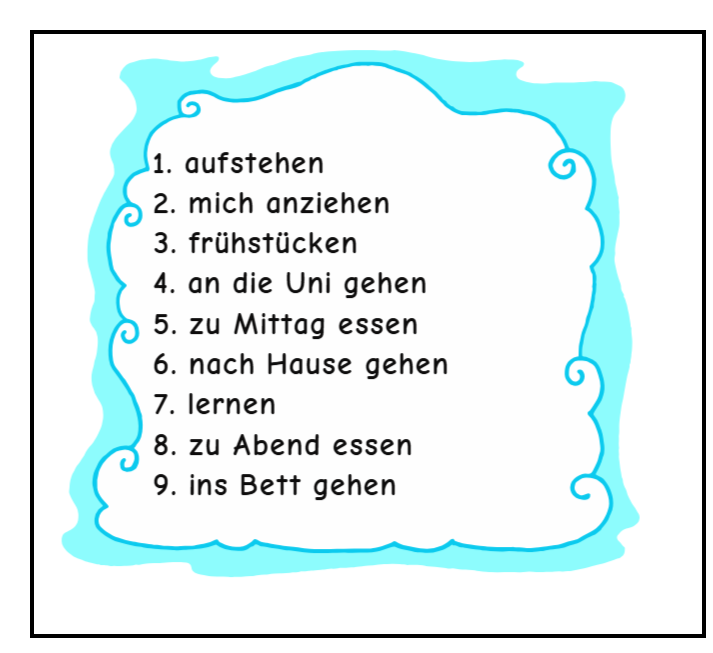5.9 Die Tagespflichten

Servus!
Zum Aufwärmen machen wir unseren Tagesminiplausch und eine Wiederholung.
Wiederholung
In the previous lesson, you learned new ways to express time and how to talk about your daily tasks. Let’s review what you have learned.
Wann frühstückst du? Wann gehst du an die Uni? Wann lernst du in der Bibliothek? Answer the questions in your written journal, write down at least four daily tasks that you do and the times at which you do them.
Lektionsüberblick
This lesson is all about “must-dos”. What do you have to do each day? Or, what must you do each day? German has just one word for those two ideas: müssen. We will look at how to use this word in this lesson. In the end, you will be able to 1) say what things you have to do, 2) say whether you have to work during your studies (and what kind of work you have), and 3) say when you have to do things.
Was weißt du schon?
Let’s do a quick skills check.

| Noch nicht start klar?
Du kannst immer auf die gleiche 1010-Lektion zurückgreifen! |
Not confident about starting this lesson?
You can always review the same Lektion from 1010. |
1) Was ich machen muss
In Deutsch im Alltag I, we looked at a list of things that we have to do each day. Now we are going to turn those into complete sentences. First, read the list and then see how the sentences are built.
What do you notice about the word order? How is it different than English?
Let’s practice.
Jetzt bist du dran!
Stuttgart im Blickpunkt

Die Staatsgalerie Stuttgart ist eines der wichtigsten Kunstmuseen Baden-Württembergs und eine der bedeutendsten Kunstsammlungen Deutschlands. Sie wurde ursprünglich von König Wilhelm I. von Württemberg als Museum der Bildenden Künste gegründet. Die Alte Staatsgalerie wurde 1843 und der postmoderne Erweiterungsbau, die Neue Staatsgalerie, 1984 eröffnet. Das postmoderne Gebäude von James Stirling gilt als Meisterwerk dieses Baustils in Deutschland. (Ein Blick von oben kann man hier sehen.) Die Sammlung der Staatsgalerie umfasst insgesamt rund 5000 Gemälde und Plastiken mit Malerei ab dem Hochmittelalter, Skulpturen ab dem 19. Jahrhundert sowie eine umfangreiche graphische Sammlung.

The Staatsgalerie Stuttgart (State Gallery) is one of the most important art museums in Baden-Württemberg and one of the most significant art collections in Germany. It was originally founded as the Museum of Fine Art by King Wilhelm I of Württemberg. The Alte Staatsgalerie was opened in 1843 and the postmodern annex, the Neue Staatsgalerie, in 1984. The postmodern building by James Stirling is considered a masterpiece of this architectural style in Germany. (A view from above can be seen here.) The Staatsgalerie collection contains around 5,000 paintings and sculptures with paintings from the High Middle Ages, sculptures from the 19th century as well was an extensive graphical collection.
2) Arbeiten müssen
It’s common for many students to have to work while going to school. Read and listen to the question. How does each person respond? Do they have to work while going to school?

|
Let’s work on formulating a complete sentence as a response. Notice the word order again.
Let’s practice.
The characters in the comic are lucky. Sie müssen nicht während des Studiums arbeiten. But here are some ways you can respond if you do work during school.
 |
Ich arbeite bei [name of company or store]. |
 |
Ich habe einen Teilzeitjob bei [name of company or store]. |
 |
Ich habe einen Ferienjob bei [name of company or store] |
 |
Ich mache ein Praktikum bei [name of company or store]. |
Kleiner Hinweis
To help with formulating these responses, here are a few definitions.
der Teilzeitjob = the part-time job
der Ferienjob = the seasonal job/summer job
das Praktikum = the internship
Jetzt bist du dran!
3) Wann ich alles machen muss
Of all the things you have to do each day, which of the things must you do at a certain time? Read, listen, and repeat the example sentences below.
 |
Ich muss um 7hr aufstehen. | |
 |
Ich muss um halb neun an die Uni gehen. | |
 |
Ich muss um sechs Uhr abends zur Arbeit gehen. | |
 |
Ich muss um halb elf ins Bett gehen. |
Let’s practice.
Jetzt bist du dran!
Zum Schluß

*As you conclude this lesson, don’t forget to check Canvas!*

Media Attributions
- 1020-banner-large-reduced
- IMG_1211
- Comic made at www.MakeBeliefsComix.com
- Photo of salesman by pexels-cottonbro-6116865
- Photo of delivery man by pexels-kindelmedia-6868168
- Photo of lifeguard by pexels-caio-mantovani-97605853-16135846
- Photo of working women by pexels-fauxels-3184298
- Photo by pexels-olly-3801690
- Photo by pexels-ketut-subiyanto-4546117


